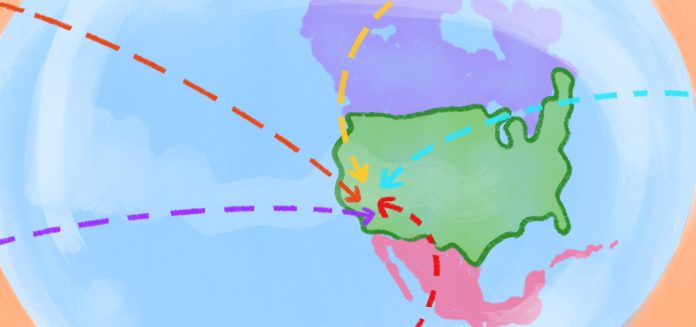Felix Dong
Staff Writer and Photographer
The fall 2021 UC Education Abroad Program (UCEAP) cohort was the first to go abroad since March 2020, nearly two years ago. The return from study abroad can lead to a feeling of re-entry shock. According to UC Santa Barbara UCEAP, 85 percent of people returning from abroad have some kind of difficulty with re-entry, which can range from restlessness, boredom, and feeling misunderstood.
To find out more about the reverse culture shock that comes with returning from living abroad, The Bottom Line (TBL) sat down with Vanessa Luu, Veronica Vo, and Ankita Pattnaik, three study abroad students who studied in South Korea for four and a half months, to discuss their experience and reflect on their readjustment back to campus.
Reverse culture shock is similar to culture shock, except it deals with transitioning back to your home country. When you came back, were there any things that surprised you or even caught you off guard?
VL: “I think I just had to remember that people are not so trustworthy here, so I can’t just leave my [belongings] out. Like going to the bathroom at Starbucks without fearing that my laptop is going to be gone when I come back. Because most [of the people in Korea] would just leave laptops out for an hour, leave, and then come back […]”
AP: “I can’t even say reverse culture shock even happened to me, because when I went to Korea, I was just culture-shocked! So when I came back, everything was just back to normal. Especially for me in Korea, I definitely felt like a foreigner. You guys were sometimes mistaken as Korean but I was always treated as a foreigner so everything was always brand new to me. And I never understood what was going on. So when I came back here, I didn’t really have strong emotions. I was like, ‘Oh, everything is back to normal now’ because in Korea, I was constantly on my toes.”
Do you think certain factors, such as not learning the language, affected your culture shock?
AP: “Yes, because when I went in, I definitely expected more people to know English. But that’s my close-mindedness. I feel like ‘shock’ is kind of [a negative term]. It wasn’t really shocking, I just had to learn the language, which I didn’t expect. I can’t blame [locals] for not knowing the [English] language, because I’m the one visiting their country.”
What was harder, the transition to Korea or the transition back from Korea?
VL: “[My friends say], ‘Oh my God, you’re back, How was your trip?’ They are excited to see me after six months and see how I changed. I’m like, ‘Yeah, I missed you too…’ I wouldn’t say I’m not happy to be back. But there’s not much to do here [in the U.S.]. In Korea, there were so many options. You know, I felt like I was wasting my time sitting inside [in Korea]. Here, I do not want to step outside. *laughs* Like there’s nothing to entice you to be outside. Over there in Korea, I was [thinking that I was] getting homesick. My family, my friends, my parents are like, ‘Oh, I miss you!’. I felt a little guilty. Do I really miss being home? I was having a good time. So I [realized] I don’t really miss home or the idea of being home.”
VV: “Also, nothing changed at home, but everything changed for us. There’s the social aspect [too] because when you’re in Korea, you’re just jumping around doing everything. And everyone’s [asking others], ‘Want to go here? Does anyone want to go here?’ At home, it’s like, ‘Who wants to go to State Street […]?’ Nobody. There’s no pressure to meet new people. You spend the same time with the same people every day.”
What are some final thoughts coming back from Korea? Any thoughts about the transition back from Korea to the US?
AP: “I would do [study abroad] again but not in Korea.”
VL: “I do have to readjust to life back here. Also, my social battery is really drained. In Korea, I was going out with people all the time and having to meet new people all the time. So I’m not really in the mood to do that here. I also think that having to readjust to not doing something every single day besides [academic] work. For me, at least, the classes over there were a lot easier. Having to readjust to reading 100 pages a week and building my knowledge […] give me a break! I feel like [now] my social life is so much more slow-paced. I focus a lot more on school but I wish it was reversed.”











